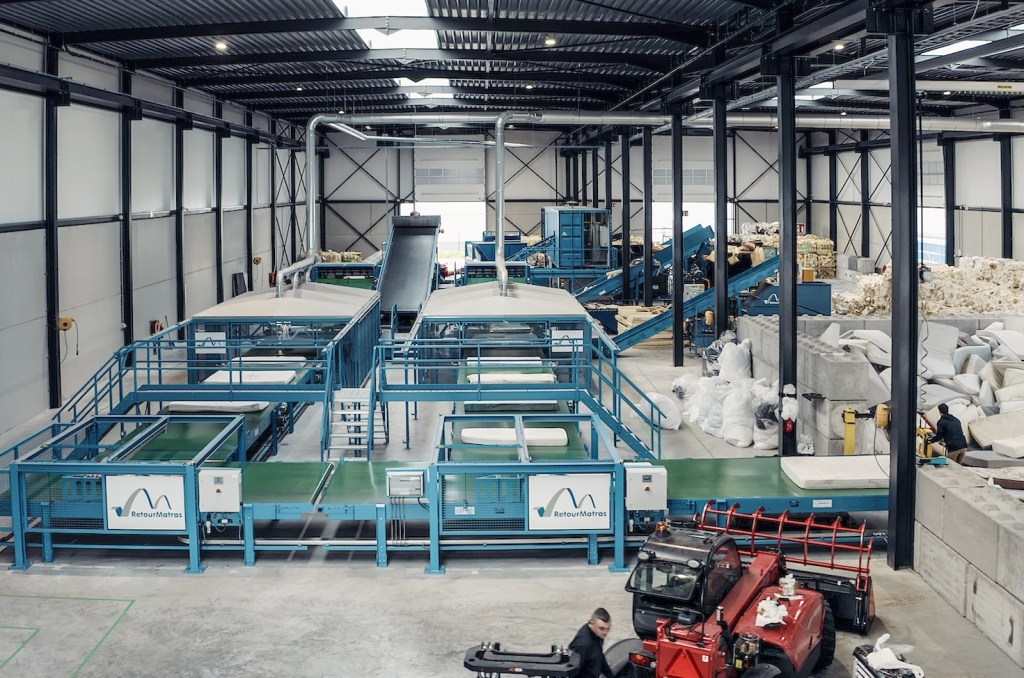$1B investment gets IKEA closer to being ‘fully circular’ by 2030
The retailer's venture capital arm backs three recyclers and a software firm. Read More

Ikea’s mid-January investment of more than $1 billion in three recycling ventures is one of the largest funding infusions yet from one of a relatively small group of retailers seeking to scale access to recycled materials.
Ingka Investments, which holds assets under management of roughly $28 billion as of February, is investing in companies that executives say will advance the retailer’s goal of becoming a “fully circular” business by 2030. They include the three disclosed Jan. 15 — mattress recycler RetourMatras; and plastics recyclers Morssinkhof Rymoplast and Next Generation Group — as well as software firm Winnow, which helps cut food waste.
“All of the companies we invest in could be a potential supplier, but it is not a prerequisite,” said Lukas Visser, investment director at Ingka Investments.
Ingka Group’s parent, Inter Ikea, already buys materials from RetourMatras for use in upholstered furniture and Ikea-branded mattresses. It uses recycled plastics from Morssinkhof Rymoplast to make products including trash cans.
Ingka’s investment criteria
The scope of Ikea’s recycling and circular production investments isn’t limited to reducing waste. Emissions related to product end of life accounted for 7 percent of emissions in fiscal year 2024 for Ingka Group, the largest Ikea retailer.
That was 14.6 percent lower than its baseline in FY 2016 and represents a higher mix of recycled materials, which helped cut emissions, according to the company’s annual report.
For example, 16.2 percent of the wood used in Ikea products came from recycled sources in its 2024 fiscal year. Some of this wood comes from Ingka’s own operations — all of the treated wood waste at its eight Belgium stores and distribution centers was recycled.
RetourMatras sells customers such as Ikea on the potential emissions reductions of using its recycled material for mattresses — up to 76 kilograms of carbon dioxide equivalent, compared with the common practice of incineration. The company has the capacity to handle up to 2.5 million mattresses annually, and its customers are municipalities and retailers.
“Given the breadth of mattresses disposed, the possibility for expansion is immense,” said Chico van Hemert, managing director of RetourMatras. “However, investment is needed to speed up its adoption.”
Ingka’s investments, like those of other retailers, are mainly focused on materials for which little infrastructure exists. It looks at two main criteria: the emissions footprint of the virgin material and the existing capacity for giving that material a second life, said Visser.
Of particular interest:
- Plastic polymers such as polypropylene (commonly used for injection moldings) or high-density polyethylene (food containers)
- Food and organics avoidance
- Mattresses
- Wood
- Textiles, including cotton and polyester
Of these material types, simple plastics recycling offers the most mature startups while companies working on textiles and wood processes are at an earlier stage of their journey, according to the Ingka Investments team.
“We would like to be a meaningful partner of a company, not just because of the capital that we bring but because of the knowledge we bring,” Visser said.
Goal: Create a reliable supply chain
More retailers are making their own private-label products — sales grew almost 4 percent in 2024 to $271 billion. That’s driving companies such as Ikea to look more closely at the supply chain for these materials, and its investments in January reflect that, said Jessica Long, chief strategy officer and managing partner at the investment firm Closed Loop Partners.
“Even if you aren’t doing this, you are looking to ensure that the products you sell, at a minimum, are diverted from landfills,” Long said.
Other retailers are prioritizing many of the same materials as Ikea, despite the cautionary tale of H&M’s $29 million investment in failed startup Renewcell, which has rebranded and reorganized as Circulose. H&M hasn’t abandoned the company, but after seven years of support it’s rethinking its approach to apparel recycling because of the challenging economics.
Inditex, parent company of the world’s largest clothing retailer Zara, is investing about $74 million over three years in recycled textiles through a strategic partnership with polyester recycler Ambercycle.
One of the biggest investments by a retailer in recycling infrastructure was the 2021 acquisition of the Suez recycling business by the owner of supermarket chain Lidl, but plastics recycling was explicitly left out of the deal.
“Given current circular business model requirements, this is purely vertical integration,” said Paul Foulkes-Arellano, founder of strategy firm Circuthon Consulting. “Some supermarkets own the farms where food is grown, others have chosen to control their own disposal. Not necessary, but highly advantageous as recycling capacity is restricted or lacking.”
A long-term investment horizon
It could take years for Ingka Investments and other retailers making similar investments to see a substantial commercial return from that capital, said Peter van der Poel, managing director for Ingka Investments. “The big thing is to make sure that we invest growth capital … making sure that we create success,” he said.
Ingka’s investment team uses a playbook familiar to corporate venture capital arms:
- Cast a net for startups that could address a core business risk or opportunity. In the case of recycled materials, there’s a bit of both as companies prepare for the rise of laws that make businesses responsible for paying end-of-life costs for the products they produce.
- Screen and validate potential investments. Ingka Investments prefers investing in founder-led or family-owned ventures.
- Gauge what it would take for the startup to scale commercially. That includes understanding how municipalities might choose to invest and figuring out what support the team might need in resources such as sales expertise and other resources.
- Initiate negotiations and due diligence. For plastics ventures, the lead times are shorter than for materials where recycling approaches are less mature.
All three companies that received Ingka Investments money in January had previously received funding from the retailer. The follow-on funding came after the three demonstrated significant growth.
“It is all about aligning with the view of the future and what’s needed,” Visser said.
[Gain insights to move beyond incremental action and accelerate the shift to a circular economy at Circularity, April 29-May 1, Denver, CO.]














